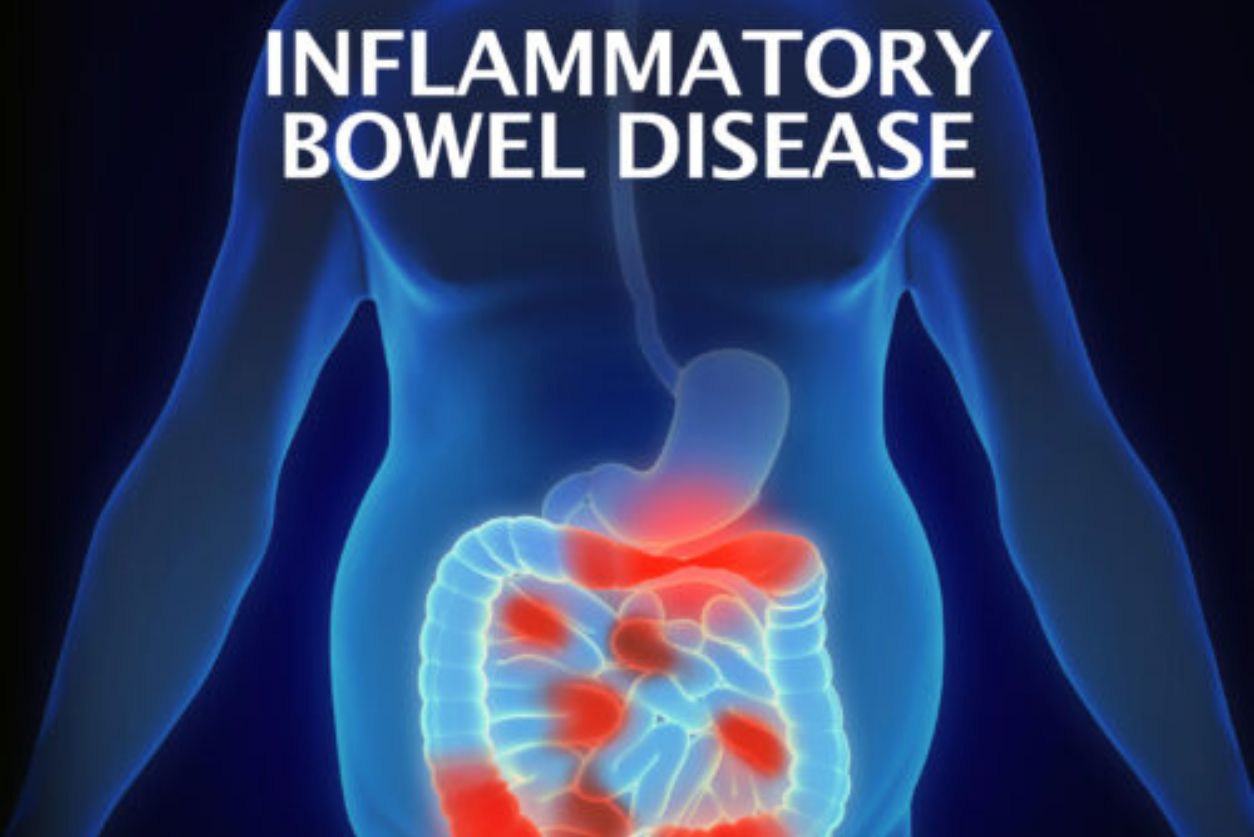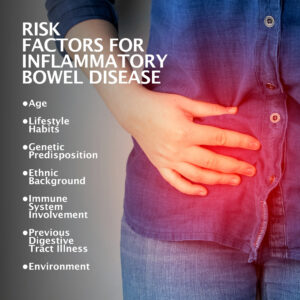
Inflammatory Bowel Disease-IBD
The digestive system is one of the most important group of organs and tissues inside your body. This network carries out several life-sustaining functions such as breaking down the foods, processing the essential nutrients your body needs, and eliminating waste products.
Any condition impacting the digestive tract can threaten the efficient completion of its processes and cause potentially serious illness. An example of this is inflammatory bowel disease (IBD).
IBD Overview
Inflammatory bowel disease is a broad term describing inflammation.
Specific Types
There are two principal forms of IBD: Crohn’s disease and ulcerative colitis. Crohn’s disease involves your digestive tract lining. It can impact almost any component along with the network, including your mouth, esophagus, stomach, and intestines. In ulcerative colitis, your large intestine (colon) is typically the only affected organ.
Risk Factors
Though no exact cause has been identified, several risk factors can contribute to the condition’s onset, including:
- Age – IBD typically occurs before age 35. But it can occur at any life stage.
- Lifestyle Habits – Your chances of contracting IBD increases if you smoke or drink alcohol excessively. These products contain irritants capable of aggravating or causing associated physical symptoms.
- Genetic Predisposition – Your risk heightens if a close relative, such as a parent, sibling, child, or grandparent has been diagnosed with the disorder.
- Ethnic Background – Though the disease afflicts people of all races, your chances for development are more significant if you are white and Jewish. Cases are rising among the black population of the United Kingdom.
- Immune System Involvement – IBD’s emergence can result from an immune system response. For unknown reasons, your body’s defenses might attack digestive tract cells, leading to inflammation and eventually a form of the disease.
- Previous Digestive Tract Illness – Occasionally, a pathogenic infection like a virus or bacteria could set the stage for inflammatory disorders.
- Environment – Scientists have found that inflammatory bowel problems occur more inside industrialized countries. This is because these populations are more likely to consume fat and processed foods full of inflammation-producing chemicals. Your risk tends to elevate if you live in a colder, northern climate or lead a sedentary lifestyle.
Symptoms
The symptoms you experience might vary depending on whether you have ulcerative colitis or Crohn’s disease.
Regardless of the specific underlying condition, you might encounter several common digestive tract issues, including:
- Diarrhea.
- Constipation.
- Abdominal cramping.
- Excess gas.
- Bloating.
- Diminished appetite.
- Blood or pus in stools.
- Fatigue and general malaise.
- Elevated body temperature.
If you have Crohn’s disease, you might also have:
- Joint and other soft tissue pain.
- Skin irritation.
- Itchy, red eyes.
- Mouth sores.
- Esophageal reflux.
- Vision disturbances.
It is also important to note that inflammatory bowel diseases often occur in spurts (flares). During active flares, you can expect to experience symptoms of the condition. Flares often die down, and you might remain symptom-free for months at a time.
Potential Complications
If not promptly diagnosed and treated, inflammatory bowel disorders can result in potentially serious complications, including:
- Megacolon – This condition arises when the large intestine swells, which can severely compromise the organ’s function and leave you vulnerable to perforation.
- Bowel Perforations – Diseased tissue can cause bowel perforations – noticeable holes or tears occurring in the colon. Perforations could lead to bowel contents and potentially hazardous materials like pathogens spreading throughout the digestive system and other body parts.
- Ulcer Formation – Inflammation can precipitate ulcer formation. Ulcers are sores capable of causing pain, interrupting the digestive process, perforating, and bleeding.
- Internal Bleeding – The inflammation and ulcers produced by these disorders can result in severe internal bleeding. If not stopped quickly, it could lead to death.
- Anemia – Occasionally, IBD-related blood loss can take place. Gradual blood loss can result in anemia, when your red blood cell count falls to dangerously low levels.
- Structural Abnormalities – Prolonged tissue destruction can alter the structural makeup of specific digestive system components. Should these changes grow pronounced, you might experience difficulties carrying out essential functions like swallowing or moving your bowels.
- Malnutrition – Over time, inflammatory bowel disorders can inhibit your gastrointestinal tract’s capacity to absorb and process nutrients from the foods you eat. As time progresses, this could result in malnutrition.
- Dehydration – These issues can precipitate prolonged and severe bouts of diarrhea. As you continue to lose measurable sums of water and electrolytes, your risk of experiencing dehydration increases. Severe dehydration can be a life-threatening medical emergency.
Diagnosis
Diagnosis is usually a multi-step process. During the process’s first phase, your doctor will first perform a thorough physical evaluation.
Once this information is gathered, your doctor might then order diagnostic tests including:
- Blood tests.
- Stool samples.
- Internal imaging devices, such as X-rays, MRI (Magnetic Resonance Imaging), and CT (Computed Tomography) scans.
Your doctor might not confirm the diagnosis until performing an endoscopy. This procedure uses a flexible, camera-equipped tube to examine your digestive tract’s inner workings. This piece of equipment also allows biopsies or small tissue samples to be extracted for laboratory examination.
Possible Treatment Options
The treatment your doctor chooses will depend upon the specific condition you have and its severity. Common forms of treatment include:
- Various over-the-counter and prescription medications.
- Dietary changes.
- Cessation of lifestyle vices like cigarette smoking and excessive alcohol consumption.
- Surgery to remove damaged tissue or bowel obstructions.
In certain instances, a combination of treatments might be indicated.
Prognosis
In uncomplicated cases, the prognosis is usually favorable. With proper treatment, you can live a relatively normal life.
Prevention
While prevention is not always possible, you can perform certain actions geared towards lowering your risk, including:
- Limiting Stress – Though sometimes overlooked, stress is a significant trigger. Tension often first strikes the digestive tract and exacerbates existing problems. If you are exposed to excessive stress levels, you should consider anxiety-alleviating activities, such as:
- Exercising.
- Listening to music.
- Gardening.
- Reading.
- Breathing techniques.
- Making Better Dietary Choices – Many foods and beverages can cause or worsen digestive tract inflammation, such as fatty foods, those with significant acid contents, canned, frozen, or heavily processed goods, spicy items, and addition to carbonated and alcoholic beverages. Doctors and nutritionists recommend eating plain, less spicy meals, and drinking water.
- Quitting Smoking – Cigarettes contain nicotine and many other chemicals that irritate the digestive system. If you smoke, you are urged to stop.
- Consuming Smaller Meals – Heavy, large meals increases tension on the digestive system, triggering flares. Instead, consume several smaller meals every few hours.
Contact Us
If you are struggling with an inflammatory bowel disease, please reach out to us. Our practice began more than 15 years ago and has emerged as one of the leading gastroenterology practices in central Florida. We perform a host of diagnostic procedures using state-of-the-art equipment in a friendly, comfortable, and inviting atmosphere where patient care is always a top priority. Contact us today!

